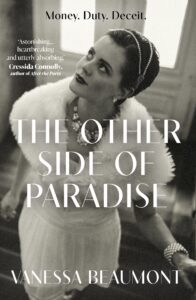As a student of literature picking up a modern novel involving interwar lavish consumerism in the West, I’m bracing myself for something rigidly estranged from the likes of Hemingway and Fitzgerald. Yet Vanessa Beaumont’s debut novel, The Other Side of Paradise, is armed with fresh perspective: an unbreakable feminine militarism, tearing both British and American aristocracy from the ledges of untouchability.
Beaumont chronicles the emergence of New York debutante Jean Buckman, ensconced in a British society of barbed aphorisms and indestructible domestic control. Jean wrestles with the British ‘stiff upper lip’ and the weight of her search for emotional fulfilment while confronting isolating preconceptions of American extravagance. Meanwhile, Beaumont’s passion for sensory writing flows powerfully in Jean’s annual trips to the French coastline. With attention paid to every languid trace of jasmine and honeysuckle in the air, entrancing retreats into French sublimity anonymise Jean in a society blossoming from aristocratic abolition.

Vanessa Beaumont (c) Ben Kelway
Beaumont’s heroine disembodies herself from title and wealth into a state of romanticised idealism, consolidated by sexual liberation. Jean’s summer fantasies become her sustenance. Yet, as her lover David aches to have her in her entirety, Jean is left clinging to her fantasy after her mother strips her of financial autonomy. Sheltering an illegitimate heir and a weakened spare under motherly protection, the consequences of expressing female sexuality are at the epicentre of the novel. Beaumont’s Jean is powerfully introspective about ‘incarnations’ of erotic female identity. Stages of sexual awakening, blooming motherhood, and bitter widowhood frame every female character as they metamorphose into each stage.
Perhaps the most powerful aspect of Beaumont’s writing is tying grief to each of her character’s most poignant vulnerabilities; they are in constant mourning of what was and what could have been.
Beaumont’s prose after a significant loss is intensely emotional when describing the most heart-breaking consequence of female sexuality: the anguish of a mother without her babies. The desolating separation of interconnected souls, from lovers and sons alike, is the greatest source of Beaumont’s tragedy. Classics such as Toni Morrison’s Beloved and Emily Brontë’s Wuthering Heights are mirrored in Jean’s reality.
The Other Side of Paradise is a fierce acknowledgement and exploration of deteriorating mental health and the desperate measures that people take to relieve themselves of pain and loss.
While the beginning of the novel is set firmly within its period, the rest of the book transcends time as Beaumont’s focus becomes Jean’s journey of self-liberation, self-entrapment and, finally, a loss of self. The Other Side of Paradise is a compelling story that charts Jean’s mental health and the shattering of her fragments of resilience.
If you enjoy the breathlessness that accompanies a quickly unravelling plot and deeply emotive prose, put The Other Side of Paradise on your reading list.
By Rachel Pennington

The Other Side of Paradise by Vanessa Beaumont
The Other Side of Paradise by Vanessa Beaumont is published by Oneworld and is available to buy now







